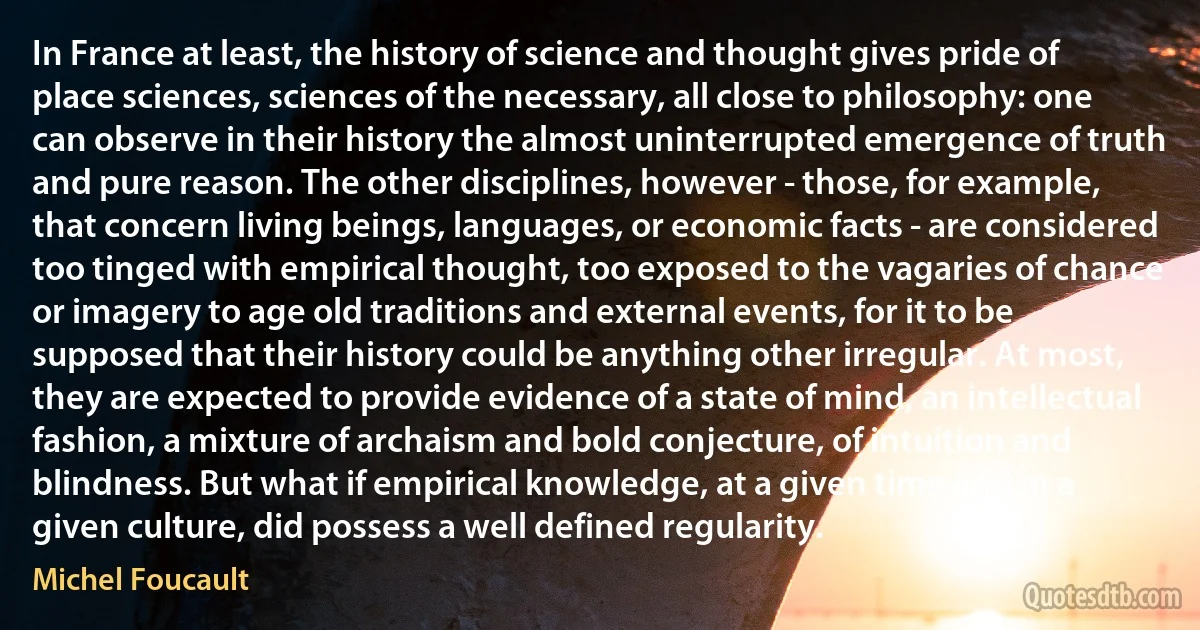
In France at least, the history of science and thought gives pride of place sciences, sciences of the necessary, all close to philosophy: one can observe in their history the almost uninterrupted emergence of truth and pure reason. The other disciplines, however - those, for example, that concern living beings, languages, or economic facts - are considered too tinged with empirical thought, too exposed to the vagaries of chance or imagery to age old traditions and external events, for it to be supposed that their history could be anything other irregular. At most, they are expected to provide evidence of a state of mind, an intellectual fashion, a mixture of archaism and bold conjecture, of intuition and blindness. But what if empirical knowledge, at a given time and in a given culture, did possess a well defined regularity.
Michel FoucaultRelated topics
age almost anything bold chance close conjecture emergence example fashion given gives history imagery intellectual intuition knowledge least living mind necessary observe place pride pure reason science state thought time truth well facts sciencesRelated quotes
Poor Joshua! Victim of repeated attacks by an irresponsible, bullying, cowardly, and intemperate father, and abandoned by respondents who placed him in a dangerous predicament and who knew or learned what was going on, and yet did essentially nothing except, as the Court revealingly observes, ante, at 193, "dutifully recorded these incidents in [their] files." It is a sad commentary upon American life, and constitutional principles - so full of late of patriotic fervor and proud proclamations about "liberty and justice for all" - that this child, Joshua DeShaney, now is assigned to live out the remainder of his life profoundly retarded. Joshua and his mother, as petitioners here, deserve - but now are denied by this Court - the opportunity to have the facts of their case considered in the light of the constitutional protection that 42 U.S.C. 1983 is meant to provide."

Harry Blackmun
Consider what kind of authority [can be ascribed to] any principle which it open to us to choose to regard as authoritative or not. I may choose for example to observe a regimen of asceticism and fasting ... for reasons of health ... What authority such principles possess derives from the reasons for my choice. Insofar as they are good reasons, the principles have corresponding authority; insofar as they are not, the principles are to that same extent deprived of authority. It would follow that a principle for the choice of which no reasons could be given would be a principle devoid of authority. I might indeed adopt such a principle from whim or caprice or from some arbitrary purpose ... but if I then chose to abandon the principle whenever it suited me, I would be entirely free to do so.

Alasdair MacIntyre
P. Bernays has pointed out on several occasions that, since the consistency of a system cannot be proved using means of proof weaker than those of the system itself, it is necessary to go beyond the framework of what is, in Hilbert's sense, finitary mathematics if one wants to prove the consistency of classical mathematics, or even that of classical number theory. Consequently, since finitary mathematics is defined as the mathematics in which evidence rests on what is intuitive, certain abstract notions are required for the proof of the consistency of number theory.... In the absence of a precise notion of what it means to be evident, either in the intuitive or in the abstract realm, we have no strict proof of Bernays' assertion; practically speaking, however, there can be no doubt that it is correct...

Paul Bernays
In conclusion, it appears to me that nothing can be more improving to a young naturalist, than a journey in distant countries. It both sharpens, and partly likewise allays that want and craving, which, as Sir J. Herschel remarks, a man experiences although every corporeal sense is fully satisfied. The excitement from the novelty of objects, and the chance of success, stimulate him to increased activity. Moreover as a number of isolated facts soon become uninteresting, the habit of comparison leads to generalization. On the other hand, as the traveller stays but a short space of time in each place, his descriptions must generally consist of mere sketches, instead of detailed observation. Hence arises, as I have found to my cost, a constant tendency to fill up the wide gaps of knowledge, by inaccurate and superficial hypotheses.

Charles Darwin
A Frenchman is self-assured because he regards himself personally both in mind and body as irresistibly attractive to men and women. An Englishman is self-assured as being a citizen of the best-organized state in the world and therefore, as an Englishman, always knows what he should do and knows that all he does as an Englishman is undoubtedly correct. An Italian is self-assured because he is excitable and easily forgets himself and other people. A Russian is self-assured just because he knows nothing and does not want to know anything, since he does not believe that anything can be known. The German's self-assurance is worst of all, stronger and more repulsive than any other, because he imagines that he knows the truth -- science -- which he himself has invented but which is for him the absolute truth.

Leo Tolstoy
